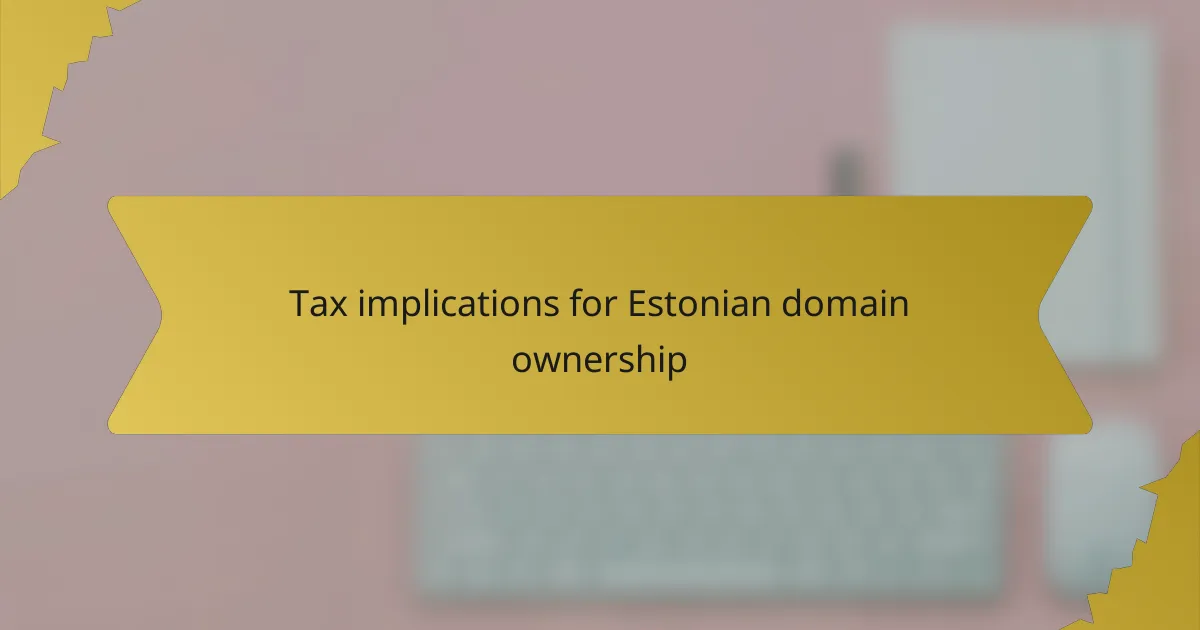Owning an Estonian domain involves various tax implications, including corporate tax, value-added tax (VAT), and income tax on potential sales. It is essential for domain owners to understand their international tax obligations and ensure compliance with local reporting requirements to avoid penalties. Proper financial planning and documentation are key to managing these responsibilities effectively.
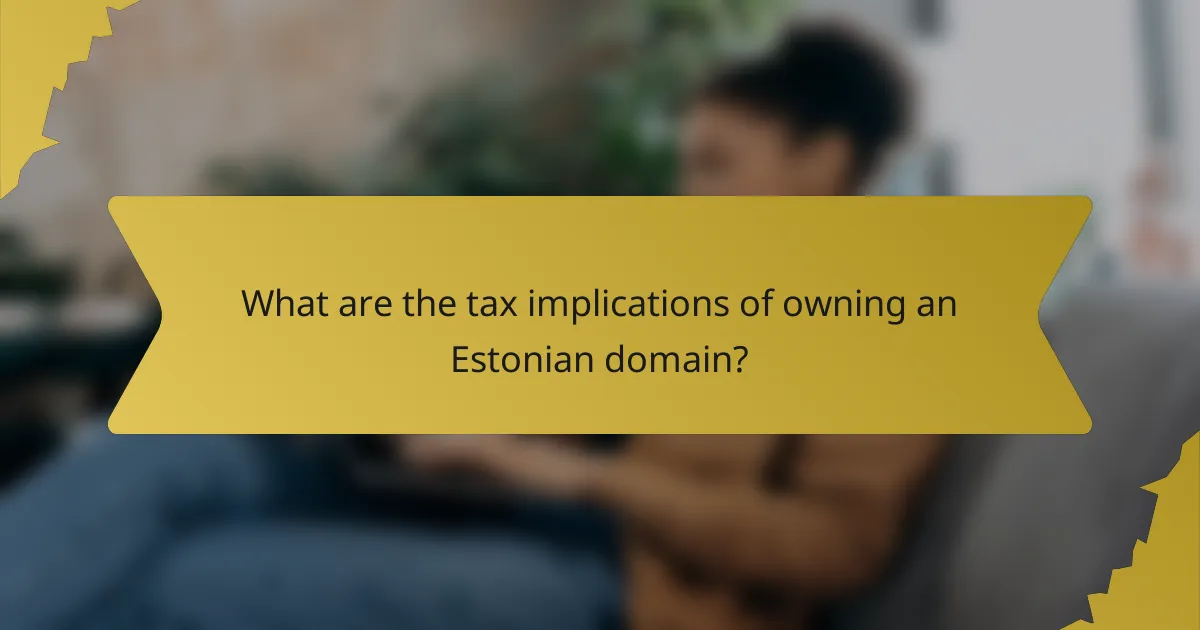
What are the tax implications of owning an Estonian domain?
Owning an Estonian domain can have several tax implications, primarily related to corporate tax, value-added tax (VAT), and income tax on domain sales. Understanding these aspects is crucial for compliance and financial planning.
Corporate tax rates in Estonia
Estonia has a unique corporate tax system where profits are only taxed when distributed. The standard corporate tax rate is 20% on distributed profits, which means that reinvested profits are not taxed. This can be advantageous for businesses looking to grow without immediate tax liabilities.
For example, if a company earns €100,000 and reinvests all profits, it pays no corporate tax. However, if it decides to distribute €50,000 to shareholders, it will incur a tax of €10,000 on that amount.
Value-added tax (VAT) considerations
In Estonia, the standard VAT rate is 20%, applicable to most goods and services, including domain registration and related services. If your business is VAT registered and your taxable turnover exceeds a certain threshold, you must charge VAT on your services and can reclaim VAT on business expenses.
For instance, if you purchase a domain for €100 plus VAT, you will pay €120 in total. If your business is VAT registered, you can reclaim the €20 VAT, effectively reducing your costs.
Income tax on domain sales
When selling a domain, the income generated is subject to income tax. For individuals, the flat income tax rate is 20%. If the domain is owned by a company, the same corporate tax rules apply, meaning tax is only due when profits are distributed.
For example, if you sell a domain for €1,000, as an individual, you would owe €200 in income tax. If sold through a company, and the profits are reinvested, no immediate tax would be due until the profits are distributed to shareholders.
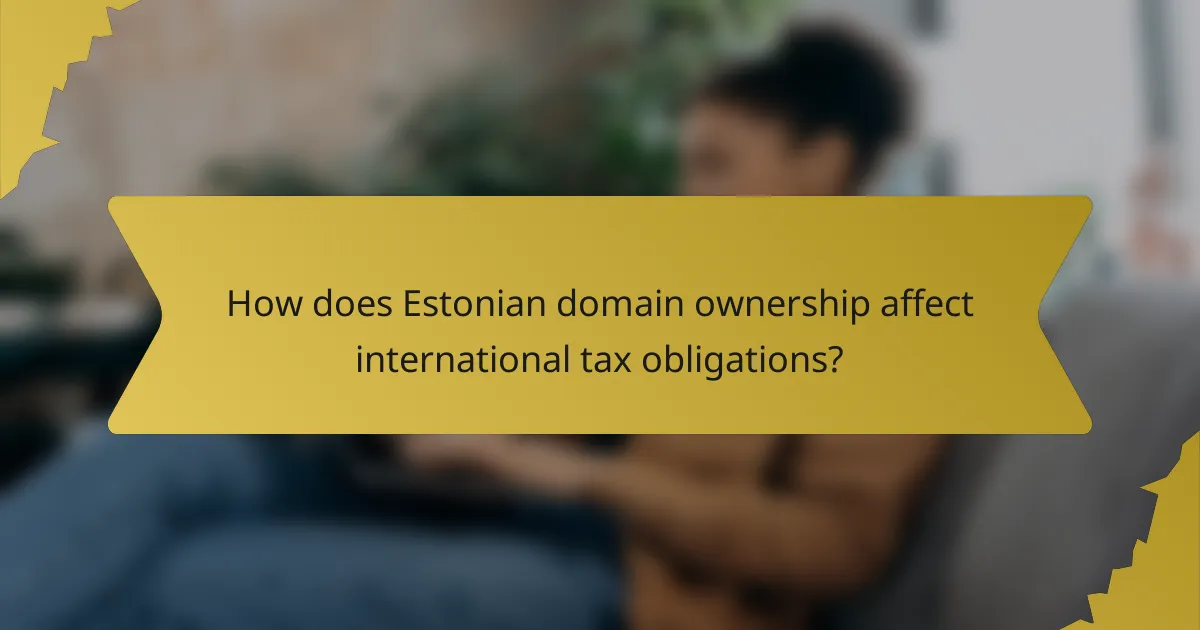
How does Estonian domain ownership affect international tax obligations?
Owning a domain registered in Estonia can have significant implications for international tax obligations, particularly regarding income generated from that domain. Tax liabilities may arise based on the jurisdiction of the domain owner and the nature of the income derived from the domain.
Double taxation agreements
Estonia has a network of double taxation agreements (DTAs) with numerous countries to prevent the same income from being taxed in multiple jurisdictions. These agreements typically allow for tax credits or exemptions, which can reduce the overall tax burden for domain owners. It is crucial to review the specific DTA between Estonia and your country of residence to understand the benefits available.
For example, if you are a resident of a country with a DTA with Estonia, you may be able to claim a tax credit for taxes paid in Estonia on income generated from your domain. This can help mitigate the risk of being taxed twice on the same income.
Tax residency implications
The tax residency of the domain owner plays a critical role in determining tax obligations. If you are a tax resident in Estonia, you are generally subject to Estonian tax laws on your worldwide income, including any income from your domain. Conversely, if you are a tax resident in another country, you may only be liable for taxes on income sourced from Estonia.
It is essential to establish your tax residency status accurately, as this will influence your reporting requirements and tax liabilities. Common criteria for tax residency include the number of days spent in a country and the location of your primary economic interests.
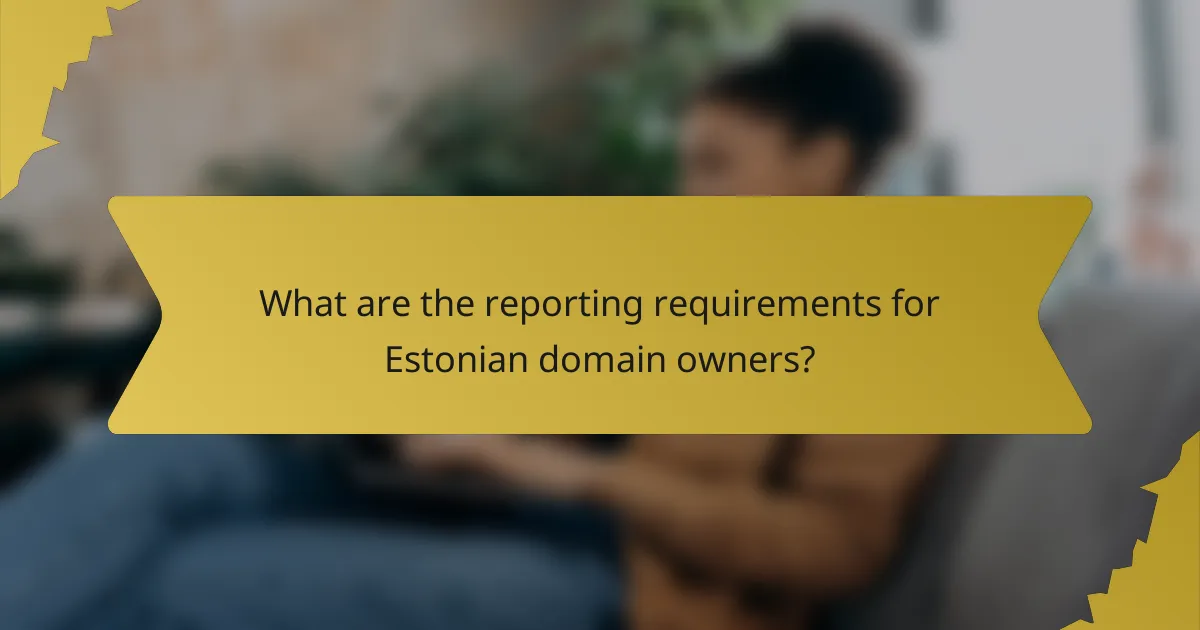
What are the reporting requirements for Estonian domain owners?
Estonian domain owners must adhere to specific reporting requirements, including annual tax declarations and proper documentation for domain transactions. Understanding these obligations is essential for compliance and to avoid potential penalties.
Annual tax declarations
Estonian domain owners are required to file annual tax declarations, which include income generated from domain sales or leasing. The income must be reported in euros (EUR) and is subject to the standard corporate tax rate, which is typically around 20% on distributed profits.
To ensure accurate reporting, domain owners should maintain detailed records of all transactions, including sales and rental agreements. It’s advisable to consult with a tax professional familiar with Estonian tax law to navigate any complexities.
Documentation for domain transactions
Proper documentation is crucial for all domain transactions to support tax declarations and provide evidence of ownership. This includes invoices, contracts, and payment receipts, which should be kept for at least seven years as per Estonian regulations.
When transferring ownership or selling a domain, ensure that all agreements are documented in writing and signed by both parties. This practice not only aids in tax reporting but also protects against disputes regarding ownership and transaction terms.
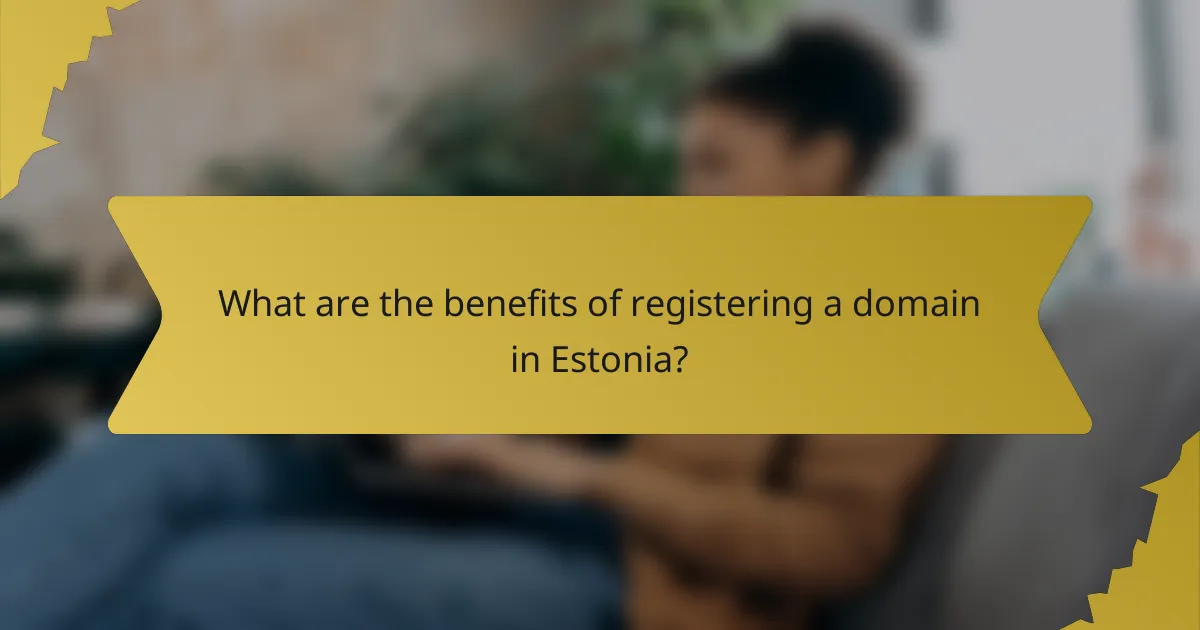
What are the benefits of registering a domain in Estonia?
Registering a domain in Estonia offers several advantages, including a favorable tax environment and access to European Union markets. These benefits can enhance business opportunities and streamline operations for both local and international entities.
Favorable tax environment
Estonia is known for its attractive tax system, particularly for businesses. The country has a unique corporate tax structure where profits are only taxed when distributed, allowing companies to reinvest earnings without immediate tax implications.
This system can lead to significant savings for businesses, especially startups and tech companies. Additionally, the corporate tax rate is relatively low, typically around 20%, which can be advantageous compared to other EU countries.
Access to EU markets
Owning a domain registered in Estonia provides businesses with direct access to the European Union’s vast market. This access facilitates easier compliance with EU regulations and standards, making it simpler for companies to operate across member states.
Furthermore, Estonia’s digital infrastructure supports e-commerce and online services, allowing businesses to reach customers throughout Europe efficiently. This can be particularly beneficial for companies looking to expand their reach without the complexities of navigating multiple jurisdictions.
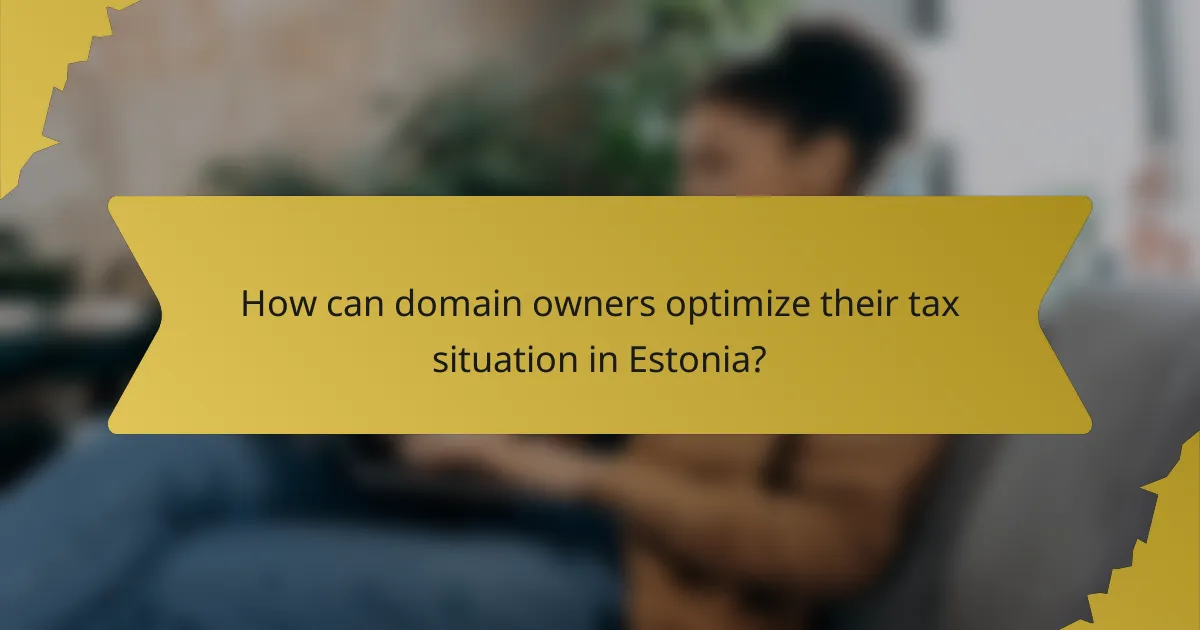
How can domain owners optimize their tax situation in Estonia?
Domain owners in Estonia can optimize their tax situation by leveraging local tax laws and available resources. Key strategies include effective tax planning and utilizing the benefits of e-Residency to manage their online businesses more efficiently.
Tax planning strategies
Effective tax planning is crucial for domain owners to minimize their tax liabilities. This involves understanding the Estonian corporate tax system, where profits are only taxed when distributed as dividends, allowing for reinvestment without immediate tax consequences.
Domain owners should consider forming a company to benefit from this taxation model. It’s advisable to maintain clear records of expenses related to domain acquisition, maintenance, and marketing, as these can be deducted from taxable income.
Utilizing Estonian e-Residency
Estonian e-Residency provides a unique opportunity for domain owners to establish and manage a business online from anywhere in the world. This digital identity allows for easy company registration, banking, and access to various e-services that simplify business operations.
By applying for e-Residency, domain owners can benefit from Estonia’s favorable tax environment, including the ability to operate a company without being physically present in the country. This can lead to significant savings and operational efficiencies, especially for those managing multiple domains or online ventures.
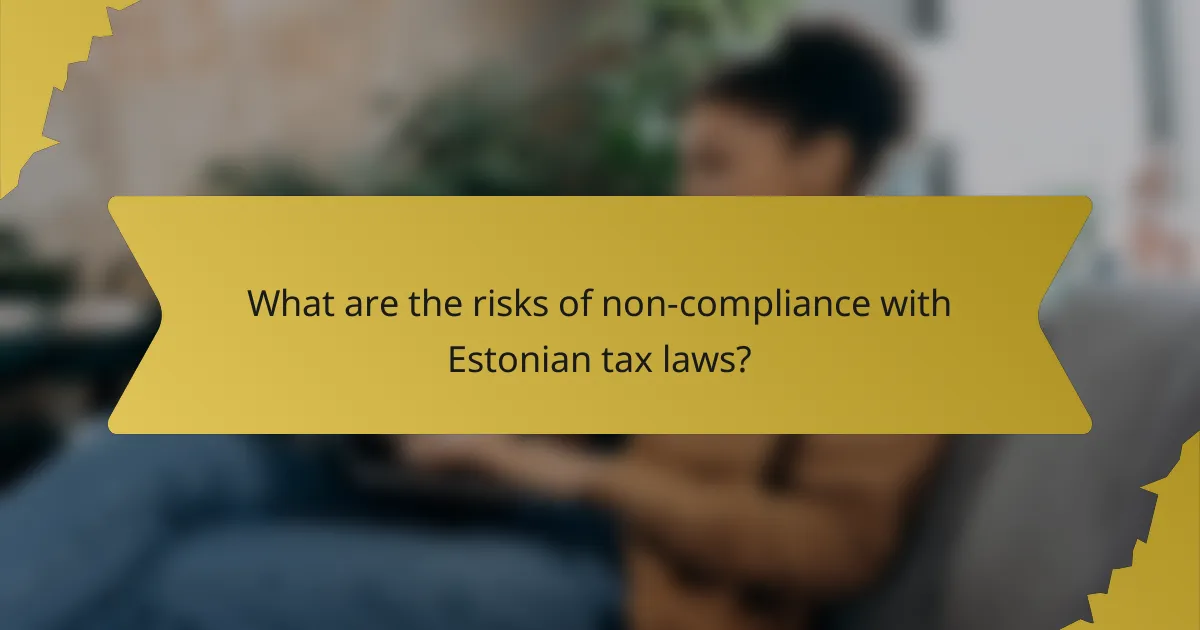
What are the risks of non-compliance with Estonian tax laws?
Non-compliance with Estonian tax laws can lead to significant financial and legal repercussions. Businesses and individuals may face penalties, interest on unpaid taxes, and even criminal charges in severe cases.
Penalties for late reporting
In Estonia, failing to report taxes on time can result in penalties that vary based on the duration of the delay. Typically, penalties can range from a few percent of the unpaid tax amount to higher rates if the delay extends beyond a certain period.
For example, if a business submits its tax return late, it may incur a penalty of up to 10% of the owed tax for delays exceeding three months. Additionally, interest may accrue on the unpaid amount, compounding the financial burden.
Legal implications of tax evasion
Tax evasion in Estonia is treated as a serious offense, potentially leading to criminal charges. Individuals found guilty of tax evasion may face substantial fines or even imprisonment, depending on the severity of the offense.
Moreover, tax evasion can result in a loss of business reputation and trust, which can have long-term impacts on operations. It is crucial for domain owners and businesses to maintain accurate records and comply with all tax obligations to avoid these dire consequences.
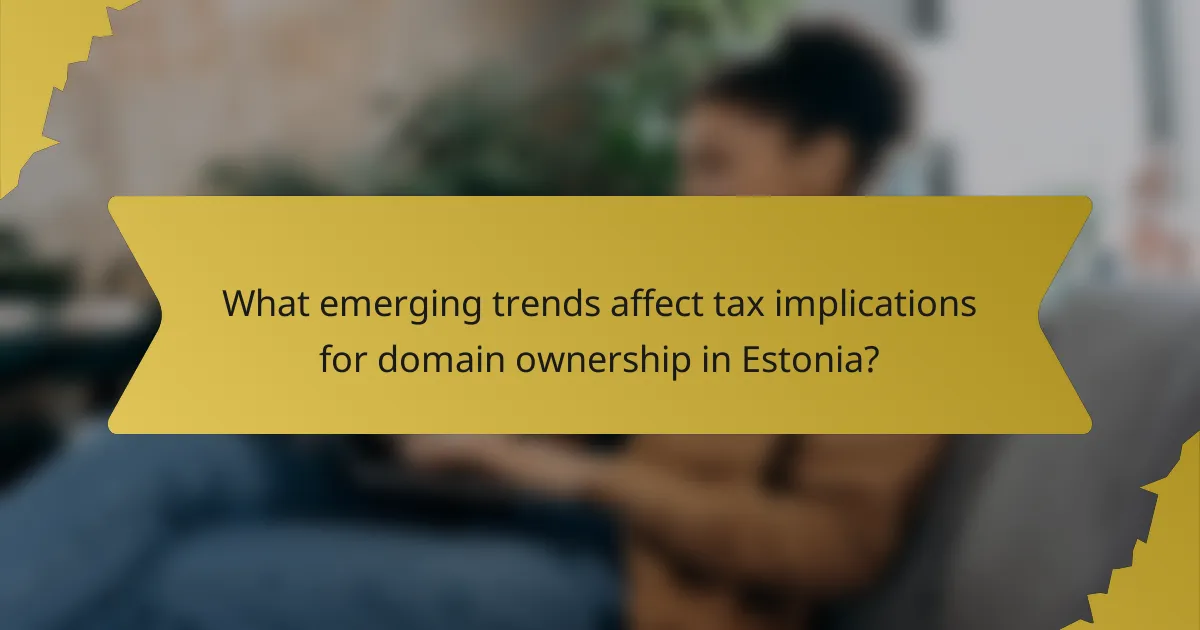
What emerging trends affect tax implications for domain ownership in Estonia?
Emerging trends in Estonia’s digital landscape are reshaping the tax implications for domain ownership. Key factors include the increasing popularity of e-commerce, changes in digital taxation policies, and the rise of cryptocurrency transactions.
Impact of e-commerce growth on domain taxation
The rapid growth of e-commerce in Estonia has led to an increased focus on how domain ownership is taxed. As more businesses establish online presence, the government is evaluating tax frameworks to ensure fair revenue collection from digital enterprises.
Domain owners may need to consider how their online activities are classified for tax purposes. For instance, if a domain is used primarily for commercial activities, it may be subject to different tax rates compared to personal use domains.
Changes in digital taxation policies
Estonia is continuously updating its digital taxation policies to align with international standards. Recent discussions around the OECD’s Base Erosion and Profit Shifting (BEPS) initiative could influence how domain ownership is taxed, especially for foreign entities.
Domain owners should stay informed about these changes, as new regulations may affect their tax obligations. Consulting with a tax professional familiar with Estonian law can help navigate these complexities.
Rise of cryptocurrency transactions
The increasing use of cryptocurrencies for domain purchases introduces unique tax considerations. In Estonia, cryptocurrencies are treated as property, meaning that any gains from selling a domain purchased with crypto may be subject to capital gains tax.
Domain owners engaging in cryptocurrency transactions should maintain accurate records of their purchases and sales to ensure compliance with tax regulations. Understanding the implications of using digital currencies can help avoid unexpected tax liabilities.
